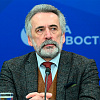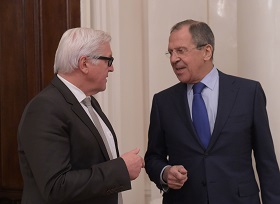The Basel meeting between Frank Walter Steinmeier, German minister for foreign affairs, with Sergey Lavrov, their statements at the plenary session of the OSCE summit and on its sidelines show Germany’s readiness to continue searching for Ukrainian crisis resolution together with Russia, despite an ostentatious inflexibility of the German Bundeskanzlerin.
On Thursday 4 December 2014 the Ministry of Foreign Affairs of the Russian Federation reported that “Sergey Lavrov, Minister of Foreign Affairs of the Russian Federation, who had arrived in Basel to take part in the work of the OSCE summit, had a meeting with Frank-Walter Steinmeier, Minister for Foreign Affairs of the Federal Republic of Germany”. During the meeting they “discussed current issues on the Europe-wide agenda, including those in the context of the situation in Ukraine, and also certain practical aspects of Russian–German relations”. The media noted that the meeting took place on Wednesday evening, i.e. before the plenary session started. Unlike the previous meeting between the heads of the two foreign affairs departments, which was held in Moscow on 18 November of this year (before which the German diplomat took part in a meeting of the Council of the European Union in Brussels and held talks in Kiev with the top political leadership of Ukraine), some details were not reported to the press.
Both ministers spoke at the OSCE summit on the morning of 4 December. Sergey Lavrov delivered his speech after his German colleague had spoken. Before this there were speeches by Didier Burkhalter, Federica Mogherini and John Kerry, the timing of which coincided with the main part of Vladimir Putin’s address to the Federal Assembly of the Russian Federation.
All the speakers in Basel were focused on Ukraine, but it was the speeches by the representatives of Russia and Germany which were most characterised by attempts to continue seeking common ground which might help to prolong a constructive dialogue in relation to possible ways of resolving the existing conflict. Frank-Walter Steinmeier particularly noted Switzerland’s efforts in this area, including its proposal to create a special expert body on matters related to the Ukraine crisis (a “Panel of Eminent Persons”).
The OSCE summit showed that it remains one of the few arenas where Russia and the West can discuss international issues in both multilateral and bilateral formats. In this respect Basel confirmed that Russian–German dialogue is one of the most important activities in such a context.
Bilateral contacts between Vladimir Putin and Angela Merkel, and also between Sergey Lavrov and Frank-Walter Steinmeier, have remained unbroken since the start of the Ukraine crisis, despite a number of harsh decisions on the part of the European Union and the USA. Telephone talks have been held constantly and continue to take place, and there have been a number of important personal meetings. It is notable that the content of the discussions between prominent figures representing our two states has effectively been concealed from the public; until recently only fragmentary information about the ministers’ meetings has been made public. But in all likelihood this too will now be accessible. One possible reason for this is that neither side wants to give the media a pretext for subjective/distorted interpretation of the discussion/dialogue going on between the leaders of the Russian Federation and the Federal Republic of Germany.
There are plenty of examples of objective facts being “freely” presented, especially by the German media. Doctored and unreliable information frequently becomes the basis for representatives of both legislative and executive authorities taking unreasonable decisions.
At the same time, in her dialogue with the Russian president the federal chancellor pointedly takes an extremely harsh stance with regard to the Russian leadership, not allowing this stance to weaken either at the Chancellery level or at the level of government or the CDU, CSU and SPD parties in the Bundestag. Angela Merkel’s government team and the parliamentary majority are pretty much united in their critical position in relation to Russia. The existing nuances in views held should not be taken as disagreements (such as, for example, the recent criticism of Frank-Walter Steinmeier’s “soft” position by the CSU’s chairman Horst Seehoffer).
The Chancellor’s harshness is to a large degree intended for her partners in the European Union and NATO, including for the USA – in this way she can demonstrate the independent nature of Germany’s relations with Russia, which are free of any “special self-serving” interests and are built on the priority of European and Euro-Atlantic values. She believes that in the current crisis situation in South-East Ukraine the time for softening the European–German position has not yet come – from her point of view the Russian state can and should make efforts/take steps to resolve it. At the same time, it seems to me that this is her sincere conviction, not dependence on “party headquarters” in Washington whose instructions force her to act in this way. Our German partners have truly been shocked by the March events and by the manner and speed with which Crimea moved from one state jurisdiction into another, and the criticism directed by the Germans to their main partner in the East of the European continent is in large measure aimed at solving the existing problems, not at humiliating and insulting the country.
However, in her desire to maintain a high level of harshness for a particular period of time (it is not yet possible to forecast how long it will last) Angela Merkel sometimes goes beyond sensible limits. This primarily concerns direct interference in the work being done to conduct and format the “St. Petersburg dialogue” public discussion arena, which also runs directly counter to the status of the federal chancellor and her department within the democratic state which according to its Basic Law the FRG is. The subsequent refusal by the German side, under pressure from the head of the German government, to hold first the public forum at the end of October and then the Coordination Committee at the end of December of this year served only to reduce the opportunities for expert cooperation between the two countries in discussing the Ukraine crisis.
In this sense there needs to be a continuing emphasis on contacts and cooperation with the German foreign ministry and its leadership, which give important signals about the future of Europe’s relations with Russia. Here I would note the opinion expressed by Frank-Walter Steinmeier before his visit to Moscow in November of this year in an interview with Welt am Sonntag, to the effect that one step to start a rapprochement between Brussels and Moscow could be to set up contacts between the European Union and the Eurasian Economic Union, which will start to function on 1 January 2015. His calls for strengthening the role of the OSCE, continuing to implement all the agreements reached and renewing active dialogue between Russia and NATO are also important.
The German minister’s meeting with Sergey Lavrov in Basel and his interesting speeches and statements at the plenary session and outside it are evidence of Germany’s fundamental readiness and desire (despite the Chancellor’s pointed harshness) to continue the joint search for ways out of the crisis. In this regard I would like to hear from our German partners about their willingness to influence the Ukrainian government in terms of real rather than formal adherence to the Minsk accords, and also about the FRG’s possible willingness to provide humanitarian aid to the citizens of South-East Ukraine in view of the onset of winter. It is a pity that such pressing issues now have to be discussed mainly via the RIAC website and other respected resources rather than through a direct dialogue.
In conclusion I would note that despite the distinct cooling of political relations, all bilateral programmes and projects in the economic, scientific and cultural spheres have continued to be implemented during 2014. They will probably also be maintained in 2015 (although it is possible that state financing for some of them will be reduced).






